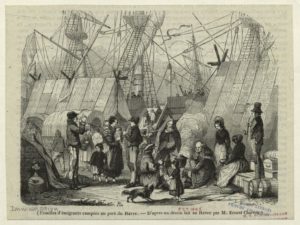
Families of emigrants camped at the port of Le Havre, 18431
Johann Fuchs (1777-1847) and his wife Anna Maria (Schüller) Fuchs (1788-1860) immigrated to America from Langenfeld, Germany in the fall of 1840. They probably made their way via the Erie Canal to Buffalo, New York, where they spent the winter of 1840/1841. Johann wrote several letters home to his grown children, and his relatives and neighbors. In these glowing letters he espoused the abundance and virtues of America in hopes of persuading them to make the same journey.
In the 1930s, researcher Joseph Scheben solicited letters received by families in Germany from their relatives in America. He studied several hundred such letters to trace the origin and final destination of German emigrants in America. One community he studied was Westphalia, in Clinton County, Michigan just west of St. Johns. It so happens Johann and Anna Maria Fuchs settled in Westphalia in the spring of 1841. Scheben studied at least one letter by Johann Fuchs and found it so endearing that he transcribed it in his book about the community. He calls Johann Fuchs the Father of Immigration.
An Industrious Hand is a Wealth in America
In his letter of February 18, 1841 from Buffalo, Johann Fuchs writes his sons-in-law Peter Gross in Langenfeld and Johann Pung in Acht, Germany.2
Dear children, sons-in-law and your children!
I wrote you in my earlier letters what the obstacles and dangers of our land and water journey were. And despite all this the strong and merciful hand of the all-powerful led us safely to America. He is praised, prized and honored!
Dear children, sons-in-law and our grandchildren! I also wrote that if you can and want to come, which is our greatest wish, then it is most advantageous that you bring along: Each 2 dippers, one cake pan, 2 dishes, spoons and coffeepot, each 3 to 4 dozen knives and forks and a grater. For what you find here you pay three-times as much. Because here they demand 6 Schillings or 1 Berlin Thaler for a knife and fork. They are very good, but it is a lot. One can use German knives and forks for one-third the price. But leave axes and hoes in Germany; because locally they cost 2 Thaler 20 Silbergroschen; they are cheap nevertheless, because the quality and durability are nearly indescribable. Don’t bring too many clothes; but bring enough shoes and boots for a few years, because the cobbler’s fee is expensive here. Fabric is also expensive; therefore bring some with you, but whole pieces are subject to duty. Concerning both sea and land travel, bring this food: a portion of jam, apple schnitzel, a half-bushel of peas, a half-bushel of white beans, coffee and sugar, however not too much; because at the French border such articles are forbidden, so you will probably have to take precautions.
Dear children! If you want to come and want several to come with you, then ensure that your group is honest, your passports are in due order and signed by the French embassy in Frankfurt. Then through all France there is no hindrance to be feared.
Contract with no ship until you get to Havre. There a sea voyage is far cheaper. If you come to Havre, the German brokers will come to meet you as you reach the city. Every one of them says he has the best accommodations. But do not believe them! See it first yourself! If it pleases you, then make a contract with them that states you can buy your own things and you can cook. Even if you must stay a few days in Havre, there is no harm; so much the better you can organize yourself.
There are Germans at the ship’s office; they are very patient to speak with you. An American post office ship sails every 18 days, and these are the safest. Whereupon one does not have to be afraid of anything; if one means, even the lowest can go speak to the captain. There is no danger.
Dear children! I have in my previous letter written you about our situation, and what I know of America, the truth of which is reaffirmed by our eyes and we consider it an abundance, all this I write you again, the fact that we are still fresh and healthy and live so joyfully and contently, that the circumstances in Germany have never to be admitted. Nothing else is wished in our household if we would have our whole family with us! For this we ask the All-powerful in our prayers three times a day everyday that He should lead you so happily this way, as He led us! With this faith we await your arrival!
Oh dear children! If you come, this is our wish, not our command. But not to our benefit, but according to all the good news and the most pleasing prospects for you and benefits to your children. You can successfully come here. You follow your dear parents and faithful brothers! You, God willing, will be very welcome by us. Everything was strange to us; one could hardly speak with others; that is completely different with you however. We are now all the more conversant! Our children get along with the Americans and with the language quite well. We will probably remain here on the canal until June. If you can come in the month of May, then you can earn so much this summer that you can live through the winter. Because your men can work on the canal and you two each accept four boarders. This pays 10 Silbergroschen everyday to everyone. This will account for the perfect wage for you and for your whole family. You can save what you earn on the canal and what you earn with sewing and knitting. If we remain healthy, then we also intend, as soon as it warms, to accept boarders, one can have enough of them here.
Oh dear children! What a difference there is between here and Germany! A plentiful income, and good and inexpensive food. One sees neither young nor old traveling by foot, all by horse or carriage. Even on Sundays they have themselves driven to church, even though it hardly warrants climbing in and out of the carriage, and they don’t own a carriage themselves. It should perhaps be the case, if you come here that you experience it. If you come to Buffalo, you can stay with the German baker and innkeeper Mr. Weiß or also with the German Catholic Pastor in Buffalo. If we left no message with them, then we are still here.
An industrious hand is a wealth in America. All craftsmen are good here. Bricklayers, stonecutters, carpenters and smiths and mechanics are foremost; and wheelwrights, bakers and nailers are least. Everywhere one sees pleasing prospects, as well as plentiful income. Who can and wants to work, who does not have a hardship, and who works through the summer, can save so much that he can live through the whole winter with a family of 4 to 5 persons.
Furthermore our most sincere greeting along with the kindest protection of the Almighty to you our children, and our brothers and sisters, brothers-in-law and sisters-in-law, relatives and acquaintances. Also to all friends and enemies.
(signed) Johann Fuchs
Johann Peter Pohl from Antweiler and Johann Peter Jakelen from Wershofen also want to come.
My address is: Johann Fuchs on the canal with Captain Bauer/Clauer in Portage[?] in the State of New York. I already gave the English address.
Notes: One Silbergroschen equaled 30 Thaler. A Kaffeegeschirr, or china coffee service, probably included cups, saucers, plates, a cake plate, and a coffeepot. Afternoon coffee time was an important ritual in German families. I could find no direct translation for the term Simmer as in “ein Simmer Erbsen.” It may be Sömmer, which Scheben states on page 139 was 23.73 Liters or a half-bushel in Koblenz. It could also mean Simri, which was a measure for corn in Württemberg equal to 22.125 Liters. It may also be Zimmer, an old term for either 60 or 40, as in 60 pounds perhaps.3
Possible Location in Buffalo
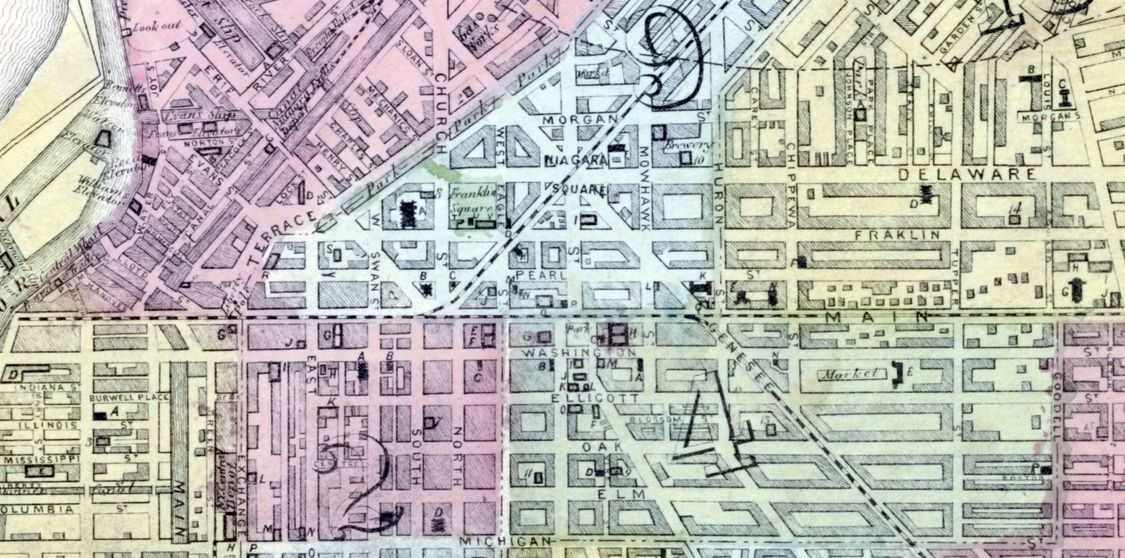
8th, 9th and 10th Wards (upper) and 1st, 2nd and 4th Wards (lower), Buffalo, New York, 18664
The Buffalo 8th Ward, in pink, upper left, was perhaps the area mentioned in the letter. Johann Fuchs named a German baker and innkeeper, Mr. Weiss. Theodore W. Weiss is listed in an 1841 city directory having the occupation of “boarding.” His house was at the corner of Water and Commerce streets near the water front. (Commerce intersects Water between the “W” and “A” in “Water,” upper middle left, near the Williams Elevator.)
Twenty-five years later, this 1866 atlas lists a John Weiss, owner of a Wine, Beer and Billiard Saloon at the corner of Elm and Genesee streets. This could be the son of Theodore Weiss. The baker and innkeeper business may have evolved into a saloon by 1866.
He also mentioned the German Catholic Pastor, which implies a single German Catholic parish at the time. St. Michael’s Catholic Church is the building marked “E,” center right. However it was not built until ten years later in 1851. The first Catholic Church in Buffalo was a log church named Lamb of God built in 1832-1833 for both French and German residents. It stood at the corner of Main and Edward streets, at the site marked “G” in the 10th Ward (yellow area, right edge). A brick church replaced the log church at the same site in 1843 and the parish became Saint Louis. That second church is shown as building “G” in the map above.
The Fuchs family may have worshiped in that first log church during the winter of 1840/1841. Or the new brick church may have been under construction by then. Perhaps that is why Mr. Fuchs did not name a specific church or parish. Several other Catholic parishes were established in the years following.
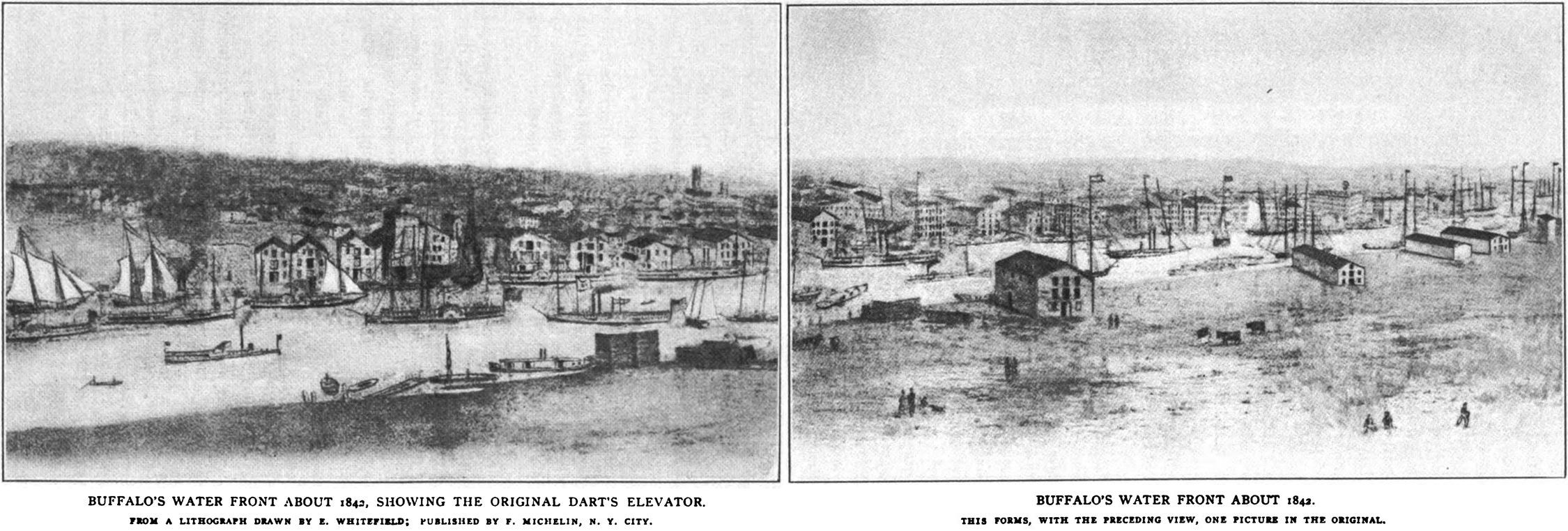
Buffalo, New York waterfront, 18425
This engraving shows Buffalo’s waterfront in 1842, a year after the Fuchs family spent the winter there. I have yet to find a Captain Bauer or Clauer as mentioned in the letter. By Podrisch, Mr. Fuchs could have meant portage, which was perhaps a lock on the Erie Canal, especially where the canal met Lake Erie.
Traveling Companions
Circumstantial evidence strongly suggests that my paternal third-great grandparents Nicolas and Catharina (Mauren) Pohl traveled with the Fuchs family. Johann Fuchs mentions in his letter that Johann Peter Pohl wanted to emigrate. He was Nicolas Pohl’s brother. This suggests that Nicolas spoke with Johann Fuchs at the time he wrote his letter. Furthermore, both the Fuchs and the Pohl families arrived in Westphalia, Michigan on the same day, May 29, 1841.
Groups of immigrant families usually traveled together, for both security and mutual support. Johann and Anna Maria Fuchs with their five children were joined by their widower son Anton Fuchs, and by Nicolas and Catharina Pohl with their four children, and by Johann and Katharina Lehman with their three children.6
Just as Mr. Fuchs instructs his relatives back in Germany, I infer this group obtained their passports from the French Embassy in Frankfurt, Germany. Although Frankfurt was out of the way, this is consistent with Nicolas Pohl receiving papers to emigrate in July 1840 and then leaving Müsch, Germany later, on August 3, 1840.7 They likely also made their way to Le Havre, France where they probably booked passage on an American packet ship. I could find none of the families listed on any ship manifest. Complete passenger lists were not required then, so it is possible they were not recorded.
Johann Fuchs mentioned he would stay in Buffalo at least until June, and that he would leave word if they left earlier. They planned to take in boarders, so they perhaps wanted to earn more money to continue their journey. However they did leave Buffalo earlier than they anticipated. The group was in Detroit, Michigan before May 22, 1841. That’s when Nicolas Pohl purchased land, sight unseen, situated in Westphalia Township, Clinton County. He likely did this in conjunction with the Catholic Church in Detroit.
In fact, Nicolas Pohl purchased 87 acres in total.8 He later sold two-thirds of it, one-third to each of his traveling companions, John Lehmen in September 1841,9 and perhaps Anton Fuchs also sometime later. Perhaps the group pooled their money, or made some other agreement. Twenty-three years later, an 1864 plat of Westphalia Township shows the three families as side-by-side neighbors on the original 87 acre Pohl tract.
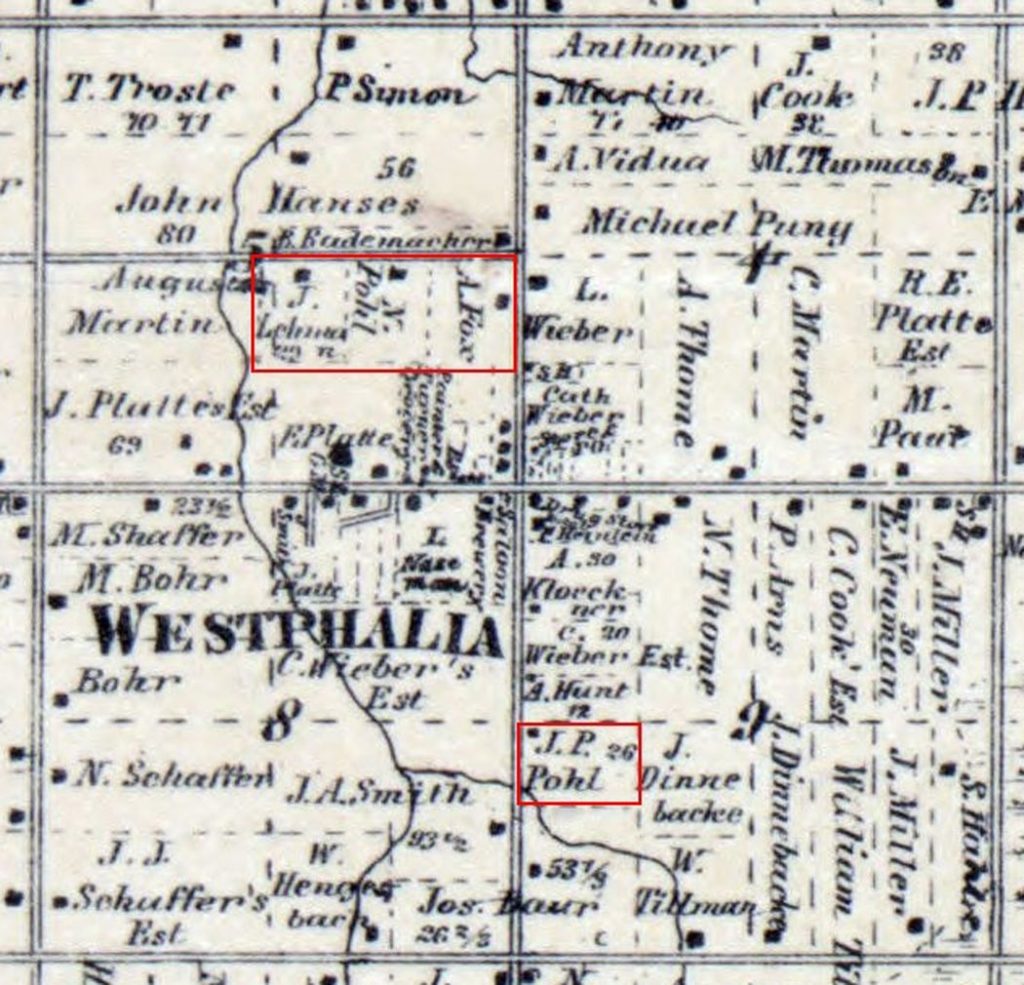
Westphalia, Michigan, 186410
Johann Fuchs’ sons-in-law Peter Gross and Johann Pung eventually did arrive in Westphalia, Michigan seven months later on September 11, 1841. Nicolas Pohl’s brother Johann Peter Pohl arrived the day after, on September 12. He bought land nearby, marked “J. P. Pohl” above.
Original Transcription
Here is the letter as it was originally transcribed by Scheben.11
Vater der Auswanderung (1841)
Brief des Johann Fuchs von Langenfeld aus Portage bei Buffalo, Staat Neu York, vom 18. Februar 1841 an seine Schwiegersöhne Peter Groß in Langenfeld und Johann Pung in Acht.
Liebe Kinder, Schwiegersöhne und Eure Kinder!
Ich habe Euch in meinem frühern Schreiben geschrieben, mit was für Hindernissen und Gefahren unsere Land- und Wasserreise gewesen ist. Und trotz diesem allem hat uns die starke und barmherzige Hand des Allmächtigen glücklich in Amerika hinüber geleitet. Ihm sei Lob, Preis und Ehre!
Liebe Kinder, Schwiegersöhne samt unsern Enkelkindern! Ich habe Euch auch geschrieben, daß, wenn Ihr zu uns kommen könnet und wollet, welches unser herzlichster Wunsch ist, was Ihr alsdann am vorteilhaftesten mitzubringen habet: Jedes 2 Düppen, eine Kuchenpfanne, 2 Schüsseln, Löffel und Kaffeegeschirr jedes 3 bis 4 Dutzend Messer und Gabeln und ein Reibeisen. Was Ihr hier Aufstand habet, bekommt Ihr dreifach bezahlt. Denn hier fordern sie für ein Gestick, nämlich ein Messer under eine Gabel, 6 Schilling oder 1 Berliner Taler.–Sie sind zwar sehr gut, aber es ist viel. Man kann deutsche Messer und Gabeln gebrauchen, die man um ein Drittel kauft. Aber Axten und Hauen laßt in Deutschland; denn die hiesigen — kostet zwar eine 2 Taler 20 Silbergroschen; dennoch sind sie billig, denn die Güte und Haltbarkeit ist fast unbeschreiblich. Mit Kleidern beladet Euch nicht zu viel; aber Schuhe und Stiefel versorget Euch auf einige Jahre, denn der Macherlohn ist hier teuer. Leinewand ist auch teuer; darum versorget Euch damit, aber ganze Stücke sind den Abgaben unterworfen. Was die Lebensmittle sowohl zu Wasser als zu Land angeht, ist das allervorzüglichste: eine Portion Quetschen, Äpfelschnitzel, ein Simmer Erbsen, ein Simmer weiße Bohnen, Kaffee und Zucker aber nicht zu viel; denn auf der französischen Grenze sind dergleichen Artikel verboten einzuführen, daher hat man sich wohl in Obacht zu nehmen.
Liebe Kinder! Wenn Ihr kommen wollet und noch mehrere mit Euch kommen wollen, so sorget, daß Eure Gesellschaft ehrlich ist, Eure Pässe in gehöriger Ordnung und von der französischen Gesandtschaft in Frankfurt unterschrieben. Alsdann ist durch ganz Frankreich kein Hindernis zu fürchten.
Lasset Euch mit keinem Schiffsakkord ein bis nach Havre. Alsdann kommt Ihr weit billiger an die Seereise. Wenn Ihr nach Havre kommt, so kommen die deutschen Makler Euch bis vor die Stadt entgegen. Jeder von ihnen sagt, er habe das beste Logis. Aber glaubet nicht! Sehet zuerst selbst ein! Gefällt es Euch, so akkordiert mit ihnen, daß Ihr Euch selbst Eure Sachen kaufet und kochen könnet. Wenn Ihr auch einige Tage in Havre verweilen müsset, das is kein Schaden; desto besser könnt Ihr Euch einrichten.
Auf dem Schiff-Bureau sind Deutsche; diese sind sehr gelassen mit ihnen zu sprechen. Alle 18 Tage geht ein amerikanisches Postschiff ab, und diese sind die sichersten. Darauf hat man nichts zu fürchten; wenn man auch meint, das unterste ginge zu oberst, das hat nichts zu sagen. Es ist keine Gefahr.
Liebe Kinder! Ich habe Euch in meinem vorigen Schreiben unsere Lage, sowie was mir von Amerika bekannt ist, in Wahrheit vor Augen gestellt und erachte es überflüssig, dieses alles Euch wiederholt zu schreiben, als daß wir noch alle frisch und gesund sind und so vergnügt und zufrieden leben, als daß die Umstände in Deutschland so zu leben nie zugelassen haben. Nichts anders wird in unserer Haushaltung gewünscht als hätten wir unsere ganze Familie bei uns! Um dieses bitten wir den Allmächtigen bei unserem Tischgebet alle Tage dreimal, daß er Euch so glücklich hierhin leiten wolle, wie er uns geleitet hat! An diesem Vertrauen harren wir bis dahin!
Ach liebe Kinder! Wenn Ihr kommet,–wir befehlen dieses nicht, wir wünschen dieses aber. Doch nicht zu unserm Vorteil, sondern gemäß allen Nachrichten und den erfreulichsten Aussichten zu Eurem und Eurer Kinder Vorteil. Ihr habet gut hierhin kommen. Ihr geht ja bei Eure lieben Eltern und getreue Brüder! Ihr werdet ja, beliebt es Gott, von uns gut aufgenommen werden. Es war uns alles fremd; man konnte kaum mit einem sprechen; das ist aber mit Euch ganz anders. Wir sind jetzt mit allem mehr bekannt! Unsere Kinder kommen mit den Amerikanern mit der Sprache ziemlich zurecht. Wir werden vermutlich bis in den Juni hier auf dem Kanal verbleiben. Könnet Ihr im Monat Mai zu uns commen, so könnet Ihr diesen Sommer so viel verdienen, daß Ihr den Winter hindurch zu leben hättet. Denn Eure Männer könnten auf die Kanal-Arbeit gehen und Ihr zwei nehmet jedes vier Kostgänger an. Diese bezahlen jeder jeden Tag 10 Silbergroschen. Dieses würde vollkommen die Ausgabe für sie und für Eure ganze Familie ausmachen. Was alsdann auf dem Kanal verdient wird und was Ihr mit Nähen und Stricken verdienet, das könnet Ihr zurücklegen. Wenn wir gesund bleiben, so sind wir auch gesonnen, sobald es warm wird, Kostgänger anzunehmen, deren man hier genug haben kann.
Ach liebe Kinder! Was ist das für ein Unterschied hier und in Deutschland! Ein reichliches Verdienst, so gute und wohlfeile Lebensmittle. Man sieht weder Jung noch Alt zu Fuß reisen, alle zu Pferd oder Wagen. Ja, sie lassen sich Sonntags in die Kirche Fahren, und wenn es auch kaum des Einund Aussteigens wert ist und selbsten kein Fuhrwerk haben. Sollte es vielleicht der Fall sein, wenn Ihr hierhin kommet, daß werdet Ihr erfahren. Wenn Ihr auf Buffalo kommt, so logiert Ihr bei dem deutschen Bäcker und Gastwirt Herrn Weiß oder auch bei dem deutschen katholischen Herrn Pastor in Buffalo. Haben wir bei keinem dieser Nachricht hinterlassen, so sind wir noch hier.
Eine arbeitsame Hand ist ein Reichtum in Amerika. Alle Handwerker sind hier gut. Maurer, Steinhauer, Zimmerleute und Schmiede und Schlosser sind die ersten; und Wagner, Bäcker und Nagelschmiede sind die letzten. Überall siehet man erfreuliche Aussichten, auch reichliches Verdienst. Wer nur arbeiten kann und will, der hat keine Not, und wer den Sommer hindurch arbeitet, so kann er so viel ersparen, daß er mit einer Familie von 4 bis 5 Personen den ganzen Winter hindurch davon leben kann.
Übrigens unsern gesamten herzlichen Gruß nebst schönster Empfehlung in den Schutz des Allerhöchsten an Euch, lieber Kinder, und an unsere Brüder und Schwestern, Schwäger und Schwägerinnen, Verwandten und Bekannten. Ja an alle Freunde und Feinde.
(Gez.) Johann Fuchs
Der Johann Peter Pohl von Antweiler und Johann Peter Jakelen von Wershofen wollen auch kommen.
Meine Adresse ist: An Johann Fuchs auf der Kanal-Arbeit bei Herrn Kapitain Bauer [Clauer?] in Podrisch im Staat New Ork. Die englische Adresse habe ich ja schon gegeben.
This letter by Johann Fuchs is historically significant because he described the immigrant experience in detail. His commentary on America very likely convinced dozens of families to immigrate. Many aspects of it are just as true today as they were 176 years ago.
The Fuchs family changed their name to Fox after arriving in Westphalia, Michigan. Fuchs is German for fox. Johann and Anna Maria are buried in the Saint Mary’s Cemetery in Westphalia, Michigan. Their remains were moved to the present location from an older cemetery nearer the church. Although unsubstantiated, this may be the grave marker of Johann Fuchs, the Father of Immigration.
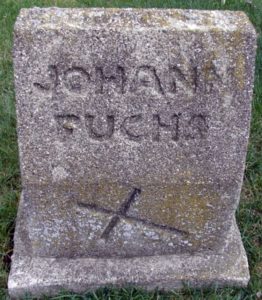
Attributed to Johann Fuchs (1777-1847)12
- New York Public Library Digital Gallery, Digital Image ID #833602 (http://digitalgallery.nypl.org).
- Translated by Mike Voisin, April 2003. Translation assistance was graciously provided by Jean Hieronymi at the Family History Center, Huntsville, Alabama.
- Units of old measure from Genealogy.net (http://www.genealogienetz.de/genealogy.html : accessed April 2003).
- “New topographical atlas of Erie Co., New York, from actual surveys especially for this atlas.” (Philadelphia: Stone & Stewart, 1866), page 18. Lionel Pincus and Princess Firyal Map Division, The New York Public Library. “Map of a Part of the City of Buffalo. Showing the Location of the Principal Public Buildings.” New York Public Library Digital Collections. (http://digitalcollections.nypl.org/items/510d47e3-1c4d-a3d9-e040-e00a18064a99 : downloaded 24 May 2017).
- Frank H. Severance, Editor, The Picture Book of Earlier Buffalo, (Buffalo: Buffalo Historical Society, 1912), Volume 16. Google Books (https://books.google.com/books?id=j9M4AQAAMAAJ : downloaded 21 May 2017), pages 26-27.
- St. Mary’s Parish, St. Mary’s Centennial, Westphalia, Michigan, 1836-1936, page 65.
- Joseph Scheben, Untersuchungen zur Methode und Technik der deutschamerikanishen Wanderungsforschung: an Hand eines Vergleichs der Volkszählungslisten der Township Westphalia, Clinton County Michigan, vom Jarhre 1860 mit Auswanderungskarten des Kreises Adenau (Bonn: Ludwig Röhrscheid Verlag, 1939), pages 54-55.
- Clinton County (Michigan). Register of Deeds. Deed records, 1836-1933; index, 1836-1912 (Salt Lake City, Utah: Filmed by the Genealogical Society of Utah, 1976). Film 0987112. Deed B, page 285.
- Ibid. Deed B, page 482.
- Geil & Harley, Worley & Bracher, Samuel Geil, and F. Bourqin & Co., Map of the counties of Clinton and Gratiot, Michigan. Philadelphia: Samuel Geil Publisher, Philadelphia: F. Bourqin & Co, 1864. Map. Retrieved from the Library of Congress (https://www.loc.gov/item/2012593020/ : downloaded 21 May 2017).
- Joseph Scheben, Untersuchungen zur Methode und Technik der deutschamerikanishen Wanderungsforschung: an Hand eines Vergleichs der Volkszählungslisten der Township Westphalia, Clinton County Michigan, vom Jarhre 1860 mit Auswanderungskarten des Kreises Adenau (Bonn: Ludwig Röhrscheid Verlag, 1939), pages 127-129.
- Jim Tipton, Find A Grave (http://www.findagrave.com/ : downloaded 29 May 2017), Johann Fuchs, Saint Marys Cemetery, Westphalia, Clinton, Michigan, Memorial #27497306.

UPDATE: Added information about “Lamb of God,” the first Catholic Church in Buffalo. It was a log church built in 1832-1833. It may have been standing when the Fuchs and Pohl families spent the winter of 1840/1841 there. The parish later became known as St. Louis.
I am the 8th great grand daughter of Johann Fuchs , my family names are Fuchs , Pung , Schaefer , Ginsterblume , Meyers. I am a direct descendant of Heinrich Schaefer & Rosina Pung through they’re only daughter Mary. Rosina died of consumption about a year after Marys birth. Henry then married Thresia Thelen and had many more children. Mary upon coming to age married ____ Ginsterblume and had many children with him one of them being Helen. Helen is my Great grandmother.
So interesting! According to Ancestry, Johann Fuchs is my 4th great-grandfather, Anton Fuchs my 3rd great-grandfather. My maternal grandmother is Jeanette E. Fox. My mother is related to basically everyone in Westphalia and Fowler-area, now it makes sense.
Thank you for posting this very detailed account of our families travel to America. I am a direct descendent of Johann Fuchs. There are 5 volumes of our lineage in the German Historical Museum in St. Cloud Minnesota. It would be great to get it republished so whoever is interested in one could have one.
My Mother was Rosalia Marie Fuchs, her Dad Leo Fuchs, his Dad Quirin Fuchs, his Dad was Anton Fuchs, his Dad was Johann Michael Fuchs.